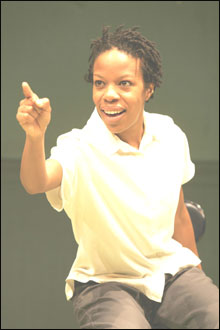
Nilaja Sun |
Here’s what happens when teaching artist Nilaja Sun takes on a typical 10th-grade class in the South Bronx. “Many of my kids — when I first meet them — have a poor diet, and I work with them early in the morning. They’ve had Lord knows how much sugar in their bodies, and then they have to go through a metal detector, so they’re already in a bad mood. These hormonal teenage kids have been forced to be adults very early, so you’re working with teenagers who feel like adults whose childhood has been taken away from them.”
These kids, their teachers and administrators, and even their custodian are among the 16 characters in Sun’s 2007 Obie-winning solo play No Child . . . The piece was commissioned by Epic Theatre Ensemble, which sends teaching artists into the New York schools. Sun thought she’d perform it for a month. But after it debuted at the Beckett Theatre in 2006, she spent nearly a year reprising the acclaimed tour de force at Off Broadway’s Barrow Street Theatre. Now the show, which also won Lucille Lortel, Theatre World, and Outer Critics Circle awards, is on a tour that brings it to American Repertory Theatre this Friday
For the past nine years, Sun has worked with kids in the New York City Public Education system. Her classes range from 20 to 36 kids, and activities include producing original shows that put as many as 120 kids on stage. The characters in her theater piece, she explains, “are distillations and amalgamations of kids and teachers I’ve worked with. There’s Mrs. Kennedy, the principal of the school for 17 years. Miss Pam, a newer teacher, who used to work in investment and decided to work in the city schools. We have the janitor, the narrator who’s seen the South Bronx morph into what it is today. Then you have all the students: the diva of the classroom, the leader, the sci-fi kind of kid, the child with a speech challenge. They’re all in 10th grade, 16 to 18 years old.”
From Sun’s vantage, the Bush Administration’s No Child Left Behind mandate has had mixed results. “I think it’s important for teachers to be accountable and schools to be accountable. That’s an idea that’s close to my heart, and it [the Bush mandate] is also the stepchild of the Elementary and Secondary Education Act of 1965, which was a great idea. But like many ideas, it’s great in the beginning. And then it’s challenging to figure it out.”
One disastrous recent development has been the excision of the arts from the curriculum. “Art needs to be the standard with all schools and all students. There are studies that say students who work with the arts wind up doing better with the testing.” But Sun adds that a curriculum that includes the arts also “creates better citizens — more empathetic and well-rounded human beings. That’s what we’re trying to achieve here in this country — not just raising a bunch of robotic individuals who don’t have any sense of empathy or community.”
No Child . . . | American Repertory Theatre, Loeb Drama Center, 64 Brattle St, Cambridge | November 23–December 23 | $39-$79; $10 senior discount; $25 students; $15 student rush | 617.547.8300
On the Web
American Repertory Theatre: www.amrep.org